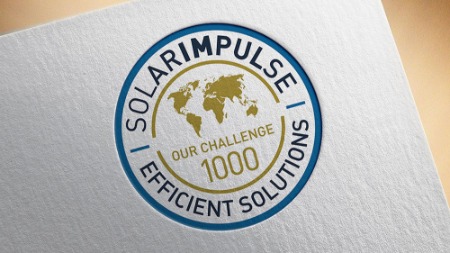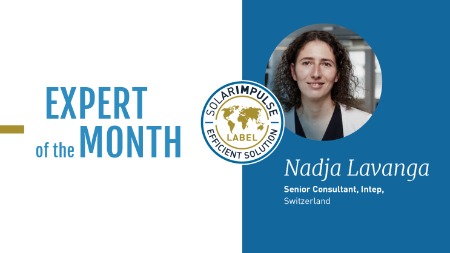Interviews - February 2, 2023
February's Expert of the Month: Benoit Coevoet!


Written by Olivia Mahaux 4 min read
The Expert Community of the Solar Impulse Foundation plays a vital role in the attribution of the Efficient Solution Label and in promoting the use of clean and profitable technologies worldwide. We are fortunate to be supported by Experts from all parts of the world with established careers in various fields like research, engineering and consulting.
Every month, we recognize the exceptional work of one of our Experts who has exceeded expectations in their role to help label sustainable and profitable Solutions. We are pleased to announce that Benoit Coevoet has been selected as February's Expert of the Month.
February's Expert of the Month: Benoit Coevoet!
Benoit has been a valuable asset to the Expert Community since joining in 2020, completing 21 assessments and being recognized as one of the 20 best-performing Experts in the 2021 and 2022 Awards. We extend our sincere appreciation for his unwavering commitment and excellent work.
In this article, we learn about Benoit's professional background and expertise.
What is your area of expertise and profession?
I have an engineering degree with a specialization in thermal and energy systems. I have 25 years of professional experience and I have always worked in the field of energy optimization for industry, first as an auditor and now directly for the Roquette company. My job has allowed me to advise more than 50 industries and to travel to over 15 countries. At Roquette, in addition to managing a team involved in industrial performance, I am recognized as a Senior Expert in the fields of energy, water and specific types of equipment that have high energy consumption (evaporator, dryer, etc.). This specific role involves providing technical expertise as well as coaching, mentoring and sharing knowledge with other employees who are developing in this same field.
You work as a Process Performance Manager at Roquette. Could you share a few details about your activity and how it’s linked to sustainability?
Roquette is a world leader in the biorefinery industry, which uses vegetable raw materials (cereals) to produce ingredients for the food & nutrition, baby food and pharmaceutical industries. My role, along with my team, is to bring solutions to improve our processes and equipment used in the manufacturing of our products. I contribute to sustainable development through daily actions like improving manufacturing yields that reduce the use of raw materials, reducing energy and chemical consumption in the manufacture of products and intensifying water saving and recycling. As an energy expert, I also participate in the deployment of large investments related to decarbonization such as the installation of biomass boilers or cogeneration and I contribute to the technological watch by seeking the application of innovation equipment, such as the use of very high-temperature heat pumps. All this not only contributes to reducing the environmental footprint of our business but also serves to maintain our industries in our countries by making them more efficient and sustainable.
How do you measure and track the performance of processes to identify areas for improvement?
In an industrial environment, measurement and monitoring are key to ensuring that manufacturing lines are always operating with the best possible efficiency at all levels. For example, we have a strong culture of monitoring energy performance through a number of dashboards to quickly detect energy deviation equipment by equipment. My team and I contribute intensively to the implementation of such systems, but also to ensuring that everyone, at their level, is engaged and contributes to improving our impact to make our planet a better place.
How do you ensure that process improvements are sustainable over time?
This question is very relevant because in the area of improvement, it is quite easy to take action and implement investments but ensuring their sustainability over time is a real challenge. We can make the analogy with high-level athletes for whom, once they have reached the peak of their sport, it remains just as difficult to stay at the top. So, just like athletes, I believe that we must maintain a high level of expectations, always question ourselves and provide continuous control and verification systems. Tools such as management systems (e.g. ISO50001 for energy) and digitalization allow us to ensure the sustainability of actions. And let's not forget the individuals who must have ambitions, have convictions, be responsible and act with common sense. Awareness, onboarding and empowerment are also important elements that will ensure that actions are anchored and move forward more quickly. Applying changes in management is not as easy as applying technical changes!
Back in 2019, you joined the Expert Community of the Solar Impulse Foundation. What led you to choose to sign up for the Expert role? Which of the Solutions you evaluated stood out to you most and why?
I chose to join the Solar Impulse Foundation because it allows me to do even more for the preservation of the planet. At my humble level, contributing to making my knowledge and expertise useful to a greater number of people is very rewarding. To me, the labeling process is a win-win-win-win situation: win for the labeled Solutions that receive public recognition and a wider field of action; win for those who can benefit from the catalog of Solutions; win for myself by offering me a new field of contribution and finally win for our planet and future generations. The innovations that made the biggest impression on me are those that address the issue of drinking water in countries where water is a rare and inaccessible resource. This allowed me to discover and be aware of a subject that was not familiar to me. But above all, I am very impressed to see that there are real actions and many people or entities doing everything to improve these situations and help others.
What are your hopes for the Labeled Solutions, and the Solar Impulse Foundation more widely?
I truly hope that the labeled Solutions can help move forward and accelerate the implementation of concrete, pragmatic solutions adapted to local issues, particularly for local authorities. It is now important to move beyond speeches and programs to action. I believe that the Solar Impulse Foundation can also be used to understand the barriers that block implementation and to take action to be a facilitator and accelerator. Acting at the level of schools and being a driving force in the education of our children about sustainable development and resource preservation is perhaps a field of action that the Solar Impulse Foundation could consider.

Written by Olivia Mahaux on February 2, 2023


